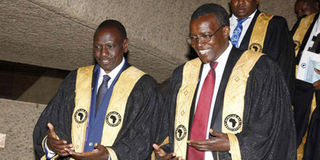DP Ruto promises to address Judiciary budget cut

Deputy President William Ruto (left) chats with Chief Justice David Maraga during the official opening of the Africa Bar Association conference at KICC in Nairobi on July 25, 2018. Mr Ruto said concerns raised by the Judiciary regarding cut in their budget will be looked into. PHOTO | DENNIS OSONGO | NATION MEDIA GROUP
What you need to know:
- Justice Maraga said operations of more than 50 mobile courts across the country will be stopped and plans to clear all cases above five years stopped.
- LSK to write to the Senate, Parliament, Attorney General, Chief Justice, and Council of Governors, to explain the negative impact of the budgetary cuts.
The society said this may erode investor confidence in the Judiciary, because commercial disputes may take long before they are settled.
Deputy President William Ruto has said concerns raised by the Judiciary regarding cut in their budget will be looked into to prevent Judiciary projects being halted.
Chief Justice David Maraga had on Tuesday warned that following the cuts, some of the Judiciary’s programmes will be stopped and others scaled down.
Yesterday, however, the DP said there will be discussions to ensure that there is a solution to the concerns raised.
The Judiciary had sought a budget of Sh31.2 billion but the National Treasury capped it at Sh17.3 billion. Parliament through Appropriation Act, reduced it further to Sh14.5 billion.
DELIVER MANDATE
Mr Ruto, who was speaking when he presided over the opening of the African Bar Association annual conference at KICC in Nairobi, assured the Judiciary that despite the country’s competing priorities in many areas, the national government will not leave the Judiciary behind.
“We will finally agree. The Judiciary has a significant role to play and if there are matters that were inadvertently done or a clear explanation not given, we will ensure that the debate goes on so that we can make sure that all arms of government can move together,” Mr Ruto said.
He assured Justice Maraga that the Executive will engage the Legislature to make sure that all the three arms of government, are resourced in a manner to enable them deliver on their mandate.
CORRUPTION FIGHT
Nairobi Governor Mike Sonko who spoke at the function urged the Ethics and Anti-Corruption Commission, the Director of Criminal Investigations and the Director of Public Prosecutions to avoid arresting suspects before investigations are completed. He said it has become common for suspects to be arrested only for the prosecution to request for more time to complete investigations, with the suspects in custody.
“This is an attack on justice and denies the suspects their constitutional right,” said Mr Sonko.
Law Society of Kenya (LSK) President Allen Gichuhi separately said that the budgetary cuts will impact on access to justice and defeat the fight against corruption.
MOBILE COURTS
“There may be very many corruption cases but few judicial officers. Backlog of cases will also increase when we have fewer judicial officers or court stations,” Mr Gichuhi said.
Justice Maraga had explained that operations of more than 50 mobile courts across the country will be stopped and plans to clear all cases above five years will also be a pipe dream.
Mr Gichuhi said stopping the mobile courts, especially in the remote parts of Kenya will hamper the ability of the marginalised communities to access justice.
“The Judiciary needs funding to complete ongoing projects. By not providing funds to complete them, the contractor will penalise the Judiciary for delayed payment and this will be a loss to the taxpayer,” he said.
CASE BACKLOG
He said LSK will write to the Senate, Parliament, Attorney General, Chief Justice, and Council of Governors, to explain the negative impact of the budgetary cuts.
He added it may also erode investor confidence in the Judiciary, because commercial disputes may take long before they are settled, “there will be case backlog and this will hamper the confidence of both domestic and international investors in our judicial system.”
British lawyer Karim Khan, who was recently appointed as the United Nations Special Adviser and Head of the Investigative Team to support domestic efforts to hold ISIL (Da’esh) accountable for crimes against humanity committed by the terrorist group, also addressed the AFBA conference.




